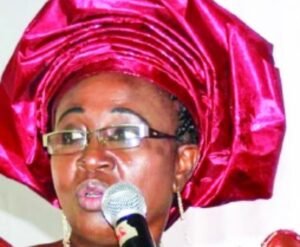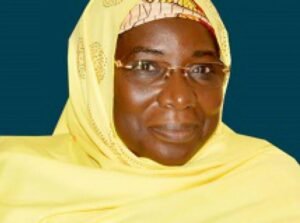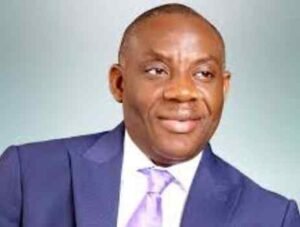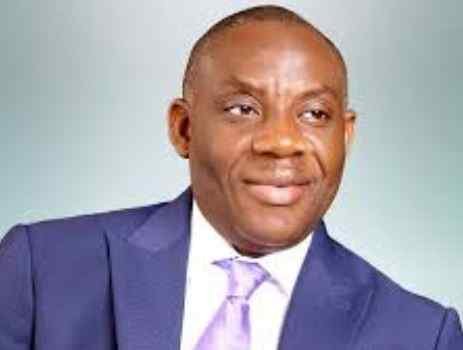The Federal Ministry of Education in Nigeria oversees the country’s education system, including secondary and tertiary education. Established post-independence, it strives to create uniform educational standards across Nigeria.
The ministry formulates national policies, collects educational data, and assures quality control through parastatals like the National Examination Council (NECO) and the Joint Admissions and Matriculation Board (JAMB).
READ ALSO: List Of Ministers Of State For Environment In Nigeria
List Of Ministers Of Education In Nigeria From 1958 Till Date
No | Name | Term of Office | Party |
|---|---|---|---|
1 | Aja Nwachukwu | 1958 - 1965 | NCNC |
2 | Richard Akinjide | 1965 - 1966 | NPC |
3 | Wenike Opurum Briggs | 1966 - 1971 | Military |
4 | Abudu Yesufu Eke | October 1971 - 1975 | Military |
5 | Ahmadu Ali | August 1975 - 1978 | Military |
6 | Garrick Barilee Leton | 1978 - 1979 | Military |
7 | Ihechukwu Madubuike | December 1979 - 1981 | NPN |
8 | Sylvester Ugoh | 1981 - October 1983 | NPN |
9 | Sunday Afolabi | October 1983 - December 1983 | NPN |
10 | Yarima Ibrahim Abdullahi | January 1984 - 1985 | Military |
11 | Abdullahi Ibrahim | 1985 - August 1985 | Military |
12 | Jibril Aminu | August 1985 - 1989 | NPN |
13 | Babs Fafunwa | 1990 - 1992 | SDP |
14 | Ben Nwabueze | January - November 1993 | SDP |
15 | Iyorchia Ayu | November 1993 - 1995 | PDP |
16 | M.T. Liman | 1995 - 1997 | PDP |
17 | Dauda Birma | December 1997 - 1998 | PDP |
18 | Samuel Olaiya Oni | August 1998 - June 1999 | PDP |
19 | Tunde Adeniran | June 1999 - January 2001 | PDP |
20 | Babalola Borishade | February 2001 - May 2003 | PDP |
21 | Fabian Osuji | July 2003 - March 2005 | PDP |
22 | Chinwe Obaji | June 2005 - June 2006 | PDP |
23 | Oby Ezekwesili | June 2006 - April 2007 | PDP |
24 | Igwe Aja-Nwachukwu | July 2007 - December 2008 | PDP |
25 | Sam Egwu | December 2008 - March 2010 | PDP |
26 | Ruqayyah Ahmed Rufa'i | April 2010 - September 2013 | PDP |
27 | Nyesom Wike | September 2013 - July 2014 | PDP |
28 | Ibrahim Shekarau | July 2014 - November 2015 | APC |
29 | Adamu Adamu | November 2015 - May 2023 | APC |
30 | Tahir Mamman | August 2023 - 2024 | APC |
31 | Morufu Olatunji Alausa | 2024-Present | APC |
Who Was The First Female Minister Of Education In Nigeria?

Chinwe Obaji was the first female Minister of Education in Nigeria. She took on the role in June 2005 and served until June 2006.
Chinwe Obaji was a dedicated educator before she became the minister of education. She was born in Ezinihitte-Mbaise, Imo State, and graduated from the University of Nigeria, Nsukka, in 1975.
Her career as a lecturer and administrator began in 1980 at the Michael Okpara College of Agriculture in Umuagwo, Imo State.
During her time as the Minister of Education, Obaji improved the education system. One of her key initiatives was bringing back the Inspectorate Division to ensure that schools maintained high standards.
She also launched a pilot program where some primary schools provided one meal per day for students. One of her boldest moves was introducing the Post University Matriculation Examination (Post-UME).
This allowed universities to screen students beyond the Joint Admission and Matriculation Board (JAMB) exams, aiming to improve the quality of students admitted into Nigerian universities.
However, there was some controversy around this, especially regarding the fees charged by universities for the post-UME.
Chinwe Obaji stood firm, directing that no more than N1,000 should be charged for the exam. She also worked to reform Nigeria’s basic education system.
She pushed to make sure every child had access to basic education, especially girls, and helped recruit teachers to serve in rural areas.
In 2007, after her time as Minister, Chinwe Obaji continued with her educational career, becoming a Professor of International Education in the United States.
READ ALSO: List Of Ministers Of State For Health And Social Welfare In Nigeria (2011-Date)
Who Was The Minister Of Education In Nigeria In 2013?

As of 2013, the Minister of Education was Ruqayyah Ahmed Rufa’i. She served from April 6, 2010, until September 11, 2013, appointed by then-acting President Goodluck Jonathan as part of his cabinet.
Ruqayyah Ahmed Rufa’i was born around 1958 in Ringim, a town in Jigawa State, Nigeria. She earned a Bachelor’s degree in Education, majoring in history, from Bayero University in Kano in 1981.
Later, she went on to complete her Master’s degree in history at the same university in 1987 and obtained a Ph.D. in Education from West Virginia University in the United States in 1991.
Between 1993 and 1996, she was the Commissioner for Health during the military government of General Sani Abacha.
In 2003, she became a professor and was later appointed the Commissioner for Education, Science, and Technology in Jigawa State. She improved educational access, particularly for girls, a significant challenge in northern Nigeria.
In September 2013, Ruqayyah Rufa’i, along with eight other ministers, was relieved of her duties by President Goodluck Jonathan, amid political tensions within the ruling People’s Democratic Party (PDP). After her term as Minister of Education, she was succeeded by Nyesom Wike.
READ ALSO: Top 10 Most Popular Female Politicians In Nigeria You Need To Know
Who Is The Current Minister Of Education In Nigeria?

The current Minister of Education in Nigeria is Dr. Morufu Olatunji Alausa. He is a Nigerian medical doctor and politician who has been appointed to lead the Ministry of Education at a time when the sector faces many challenges, including funding shortages, strikes by teachers, and the need for curriculum reforms.
Dr. Alausa was born and raised in Nigeria. He studied medicine at the University of Lagos, and earned his medical degree, a Bachelor of Medicine and Surgery (MBBS), in 1993.
After completing his medical degree, he moved to the United States to further his studies. He was trained in Internal Medicine at Cook County Hospital in Chicago and also worked as Chief Medical Resident.
Later, he specialized in nephrology, completing his fellowship at the Medical College of Wisconsin in 2004. Dr. Alausa has worked in both private and public healthcare throughout his career.
He has more than 30 years of experience in the field. Also, he founded the Kidney Care Center, a large nephrology practice, and worked as an Assistant Professor at Rush University Medical School.
He has been recognized as one of America’s Best Physicians several times. However, Dr. Alausa’s political career began when he was appointed as Nigeria’s Minister of State for Health and Social Welfare in August 2023.
In this role, he focused on improving healthcare services and making them more accessible to Nigerians. In October 2024, he was appointed as the Minister of Education following a cabinet reshuffle.
Dr. Alausa faces several challenges as the education sector has been struggling with a lack of funding, which affects the quality of education and infrastructure in schools. He is also tasked with overseeing the implementation of a new curriculum that is set to begin in 2025.

